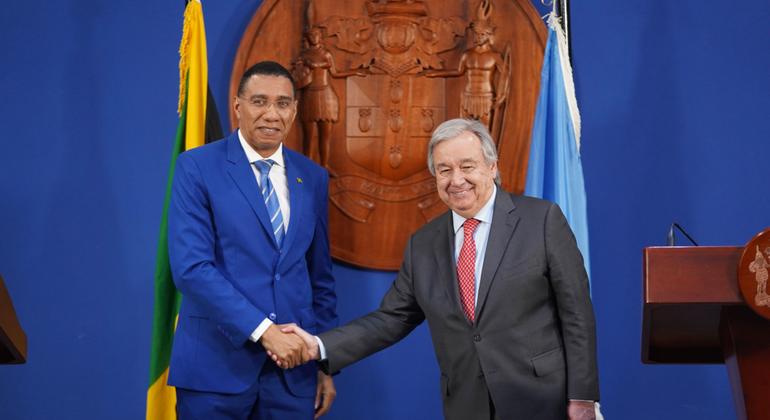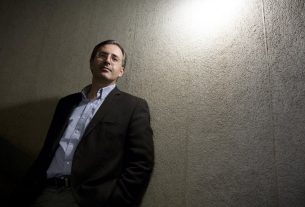“We are determined to do our best to correct it and this is the reason of my visit”, Secretary-General António Guterres said at a joint press conference, with the Jamaican Prime Minister, Andrew Holness.
Mr. Guterres also said they had discussed the “tragic situation” in Haiti, that was one of the biggest political challenges facing the whole Caribbean region, praising Jamaica’s involvement in seeking urgent solutions to the crisis there, along with the regional intergovernmental bloc of 15 Member States, CARICOM.
Peaceful invasion
He paid tribute to Jamaica’s ability “to invade peacefully the whole world, with its culture, its music, and its art” over recent decades, proving that diversity in the post-colonial era, can be a “richness, not a threat”, as long as the right policies are adopted.
“We are today facing – when we look at the present international financial architecture – a moral problem, a power problem, and a practical problem”, said the UN chief.
On the moral dimension, he reminded that COVID-19 vaccine development, distribution and recovery, had been dominated by the richer countries, who could print money, while developing countries could not.
He recalled the huge global liquidity problem where skewed international rules meant that injustices were institutionalized, with the least developed countries left to the mercy of borrowing and debt mechanisms, that are outdated and unfair.
Climate frontline
“Small island developing states in particular, have a high level of vulnerability because of the structure of their economies because of their geographic location, their size and because of the enormous impact they suffer in relation to climate change.”
Secondly, he pointed to the old power structures created as World War Two came to an end, at Breton Woods, when countries like Jamaica were still British colonies, without a voice, along with much of Africa.
“And obviously, the structure of what was created, with smaller limitations during the last decades, reflects the power relations that existed after the Second World War. They are outdated and so, the system is unfair and dysfunctional. The system needs reform, to adapt it to the realities of today’s global economy.”
And now, he added, there are numerous practical challenges to sustainable and fair development:
“And much more can be done in relation to a better link between climate and finance and the stronger support to adaptation in particular, and in particular, in small island developing states.
Secretary-General Antónió Guterres (3rd left) admires the vibrant artwork on display at the Art Walk, Water Lane in downtown Kingston during his official visit to Jamaica.
Fixing a broken system
A lot more can be done in multiplying the effect of the work of multilateral development banks, if they change their business model – a new approach to risk – and they are able to use their resources to leverage massive access to private finance at reasonable costs for developing countries.”
The UN chief said he would be addressing the G7 this week and the G20, when it next meets, “and insist” that these moral, power and practical dimensions, are properly addressed.
He described Mr. Holness and as champion, “in relation to climate action, and a champion in relation to an effective reformed multilateral financial architecture in the world.”
Salvaging a future for Haiti
On Haiti, Mr. Guterres said the multiple crises of gang violence, a paralyzed political system, humanitarian suffering, and rampant insecurity, demand “a much stronger commitment by the international community.”
He reminded of his proposal to the Security Council, which has not yet been taken up, for “an international robust police force to crack down on the gangs, and in parallel with a political process, to create the conditions for a team to be able to address its dramatic situation.”
Jamaica had committed to the idea rapidly, he said, and along with CARICOM, is invested in trying to bring Haiti’s stakeholders together, to find a way forward.
“I want to express my full support to the initiatives of Jamaica and CARICOM. And I want to once again, ask the international community to understand that an effective solidarity with Haiti is not only a matter of generosity, it is essentially a matter of enlightened self-interest. Because the present situation in Haiti reflects a threat to the security of the whole region and further afield.”


